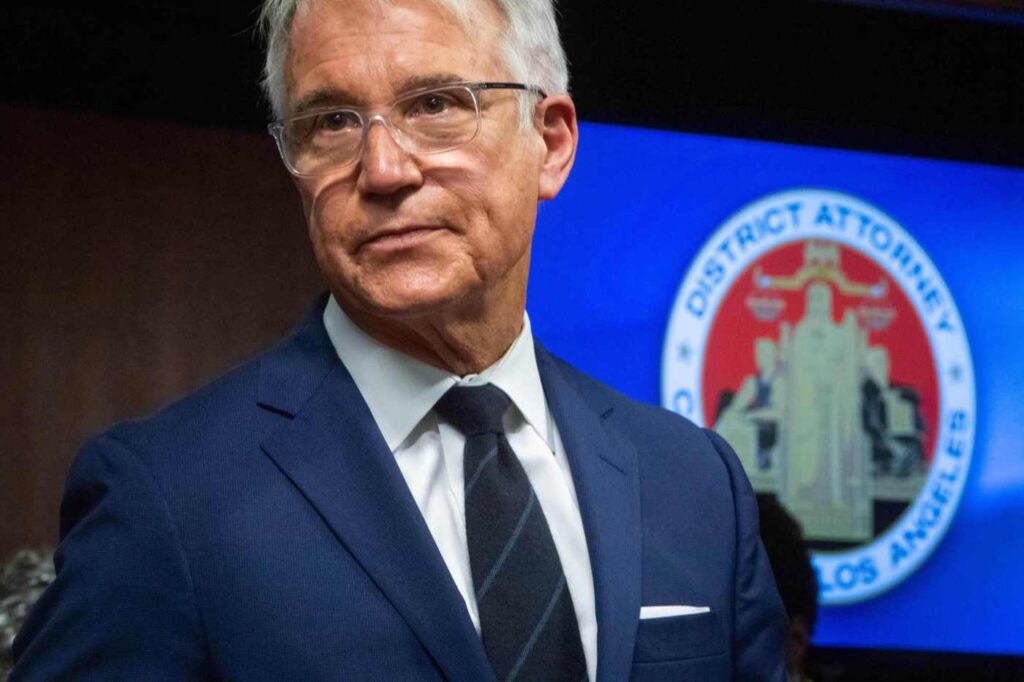
Los Angeles District Attorney George Gascón was defiant as he marked the end of his first year in office in a December 8 news conference.
“I’m not going to be intimidated by political rhetoric,” he said.
It was an odd news conference in that Gascón surrounded himself with more than a dozen district attorneys from outside of California, as if sending the message to the people of Los Angeles that we all needed to get with the program.
“We are trying to dramatically change a system that has served no one, not the victims of crime and not the public,” Gascón said.
That was December. In mid-February, Gascón dramatically changed his tune. He issued memos informing L.A. County prosecutors that they may now seek to try juveniles as adults and they may seek life sentences against some defendants. This marked a stark reversal of the blanket policies Gascón announced immediately after taking office in 2020, when he flat-out banned prosecutors from seeking the death penalty or life sentences without the possibility of parole, or trying juveniles as adults. Gascón also put strict limits on the use of sentencing enhancements.
What changed from December to February?
The answer may be in the latest poll from the Institute of Governmental Studies at UC Berkeley. Conducted in late March and early April, the poll found that 50% of voters in the city of Los Angeles “disapprove of the job George Gascón is doing as L.A. County District Attorney,” with 32% saying they disapprove “strongly.”
How many city residents approved of the job Gascón is doing? Eight percent approved “strongly,” and 21% percent approved “somewhat.”
The city of Los Angeles comprises about 40% of the population of the county. Gascón’s approval numbers are likely worse in more conservative areas. More than 30 cities in L.A. County have voted “no confidence” in Gascón’s leadership as district attorney, and a second recall effort is underway.
Gascón may not be intimidated by political rhetoric, but the evidence grows that the problem is not rhetorical.
Crime and criminal justice are complex subjects, but broad contours of the debate are simple. Who is to blame for crime, the criminal or the wider society? Should the response to crime prioritize the needs and welfare of the criminal or the needs and welfare of the wider society?
Gascón has spoken with the editorial board of this newspaper a number of times and has stressed that incarceration is generally unhelpful, because eventually the incarcerated person will be released back into society and that person may become a worse threat due to the experience.
Critics of Gascón and other district attorneys pursuing similar policies have charged that this is a social experiment with no track record of success.
The record of its failure appears to be growing longer by the day and more gruesome with each new crime accompanied by a report that the suspect was released early from custody.
Perhaps everyone can agree that there is a continuum of crime, from illegal drug possession on one end to murder on the other. It’s easy to make a campaign commercial that talks about sentencing reform or rehabilitation without getting specific about which sentences would be reformed and which inmates would be released. But campaign commercials are not policies.
Gascón’s blanket directives were policies. The district attorney heads up an office of criminal prosecutors, but sometimes he spoke as if he ran a department of social services for repeat offenders. Once he told this editorial board that he had stopped the practice of sending prosecutors to parole hearings because he didn’t think the person should be “re-victimized” by having to listen to the details of the crime. “The person” he referenced was the inmate, not the crime victim.
Related Articles
Equipment tax is hobbling state’s manufacturers
No, President Biden doesn’t have the authority to cancel student loan debt
Waive the gas tax in this costly crisis
Trying to cancel “Flip or Flop” won’t improve home affordability
Let a thousand Silicon Valleys bloom
This is a window into the philosophy that views crime as a societal challenge, not as an individual choice based on a cost-benefit analysis.
“When you are on the wrong premise,” another philosopher once wrote, “you will always achieve the opposite of what you intend.”
On the premise that a system built around incarceration serves no one, not the victims of crime and not the public, the policies of George Gascón should be making our society safer and more just.
If we are achieving the opposite, check your premises.
Write Susan at Susan@SusanShelley.com and follow her on Twitter @Susan_Shelley.
